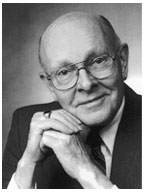|
Web Exclusives: Alumni Spotlight December 17, 2003:
Bringing stories to life Nelson Runger ’53 has read out loud all his life. When he was a child, his mother, an elementary school teacher, encouraged him to do so, to improve his verbal skills. In 1985, recently retired from public relations, he saw an ad in the New Yorker seeking book narrators. He called, eager to find something to keep him intellectually active. After a successful audition with Recorded Books™, an audio publishing company, he got his first assignment, Nathaniel Hawthorne’s short story “The Great Stone Face.” Eighteen years later, he has narrated more than 160 books, mostly biography and history, including Princeton professor James McPherson’s Crossroads of Freedom and John McPhee ’53’s Irons in the Fire. Last year he won the Audie for Unabridged Nonfiction, the audio publishing world’s equivalent of an Oscar, for his narration of David McCullough’s John Adams. A reviewer from the Philadelphia Inquirer has called Runger “one of the most remarkably talented narrators in audio books” with “a talent for making even pedantic history come alive with his remarkable voice.” When Runger narrates, it doesn’t sound as if he’s reading. Instead, he’s telling a story he knows very well. During suspenseful sections he pauses, having marked up the text with slashes to remind him how long the pauses should last. For battle or chase scenes, he quickens the pace. To achieve a “happy, light, relaxed” sound, he smiles as he reads. Last summer he recorded McCullough’s Truman, totaling some 60 hours on 43 cassettes. To make the characters come alive, Runger drew on his memory. F.D.R. had a “rather high aristocratic sort of voice and talked in a rather forceful manner when the occasion required it,” says Runger, mimicking the late president. Sir Winston Churchill, he continues, “had that marvelous British Midland raspy approach to any sort of speech, whether it was funny or deadly serious.” For people whose voices he has never heard, Runger conjures someone he knows with the same characteristics and imitates them, using similar inflections. Recording sessions last five hours and produce about two and one-half
to three hours of finished work. Recording demands tremendous concentration,
says Runger, who majored in English and lives in Pennsylvania. “I’m
pretty much bushed when it’s over.” By K.F.G.
Home Current
Issue
Web Exclusives: Headlines - PawPlus - Features Tooke's Take - Varsity Typewriter - Inky Dinky Do Raising Kate - On the Campus - Comparative Life - More... PAW Online Archives - Print Archives - Advertising Info - Reader Services Search the Site - Contact PAW Princeton University - Alumni Links - Alumni Council - Your Class Secretary |
|||

